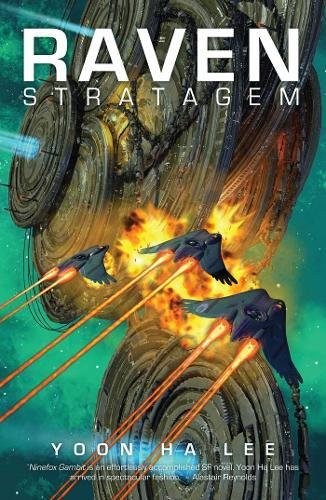G. Deyke reviewed Raven Stratagem by Yoon Ha Lee (The Machineries of Empire, #2)
[Adapted from initial review on Goodreads.]
4 stars
Raven Strategem is a bit more space-operatic than Ninefox Gambit: broader in scope, with more focus on political intrigue rather than military tactics. For the most part, all the stuff I liked about Ninefox Gambit (super nifty worldbuilding, beautiful prose, thorough characterisation) is still there. And I liked it a lot! But I did like it slightly less than Ninefox Gambit, and that's mainly down to the shift in perspective.
The high-stakes story is continued seamlessly. The low-stakes, personal story of Cheris and Jedao feels more repeated than continued, and repeated in a way I like less: rather than continuing from Cheris' perspective as in Ninefox Gambit, we once again see Jedao from the outside, from a number of other perspectives, and the whole manipulation/loyalty/&c. thing plays out again in a slightly different way. There's something frustrating in it, too, since the reader-who-has-Ninefox-Gambit-fresh-in-their-mind has important information which literally none of the perspective characters do for the majority of the book. Dramatic irony! (Probably do not take a long break between reading Ninefox Gambit and Raven Strategem.)
And the characterisation is great, as always, and many of the characters are likeable in their ways (I took a particular liking to Shuos Mikodez, this time) - but none of them is Cheris, and, well, I got pretty attached to her. I was more interested in seeing her story continue than the larger story of the Hexarchate. And her story does continue; just, not from within.
Which is all to say: the book is fine, the book is great, I enjoyed it a lot, but I couldn't help feeling slightly disappointed by it anyways. The problem here is more on my end than the book's.
I think it's worth making an extra note of the treatment of disability. I don't recall any instances of physical disability being shown, but neurodivergence is: in-universe things like crashhawks for whom formation instinct doesn't work, and less speculatively Jedao's dyscalculia and whatever's going on with Mikodez (I'm leaning heavily towards ADHD; it's not named in the book). It's enough to say that when disability is actually shown, it's shown well. Mikodez is dependent on his medication and support systems, brilliant at his job, and a complex character in all sorts of ways; his disability neither defines him, nor is it minimised; it's simply a part of him. Jedao's disability is severe in the context of his world and career, but he gets by with hard work and computer accommodations. Crashhawks have a harder time, but can get by on actual obedience. And so on - actual depictions of disability are nuanced and excellent.
Less great is the way various ableist slurs and actual-medical-terminology-but-used-as-slurs are casually thrown around by just about every character. Poorly defined madness/insanity/craziness; the word "psychotic" used interchangeably with this poorly defined madness/insanity/craziness; the word "sociopath" used as a character trait, admiringly by some and dispassionately by others, treated as common among certain demographics, and generally... just used so casually that I actually can't tell if they mean "this person has ASPD or DPD or an in-universe equivalent" or "this person is good at compartmentalising and will not allow personal feelings to get in the way of doing their job", or even if a given character uses the word consistently; the word "paranoid" used essentially to describe a lifestyle, in fact a very sensible lifestyle if assassinations are a serious risk associated with one's career, with no relation whatsoever to psychosis. These are all that I remember (I wasn't keeping a list or anything), but these sorts of terms are used with such frequency that if you're really sensitive to this sort of misuse of words, you might honestly want to skip these books even though they are great.
(I do realise that this sort of language used by characters can be a worldbuilding/characterisation thing, especially when it's accompanied by actually really good depictions of disability outside of the language used; it also didn't even disrupt my own enjoyment of the book very much; still, the warning stands.)
Anyway! The book was really good, though, and I'm looking forwards to reading the next one.
Selling points: super cool worldbuilding; magic space battles; cute robots; wide variety of queer representation, notably including a trans man as a major perspective character and an ace character who has correctly-nuanced ace sex (!); very nice characterisation.
Warning points: genocide; physical torture (slightly abstracted but essentially on-screen); fraternal incest (consensual); psychological torture; spaceships powered by sacrificed children; general disregard for life and autonomy and whatnot (by characters and society, not the narrative).

